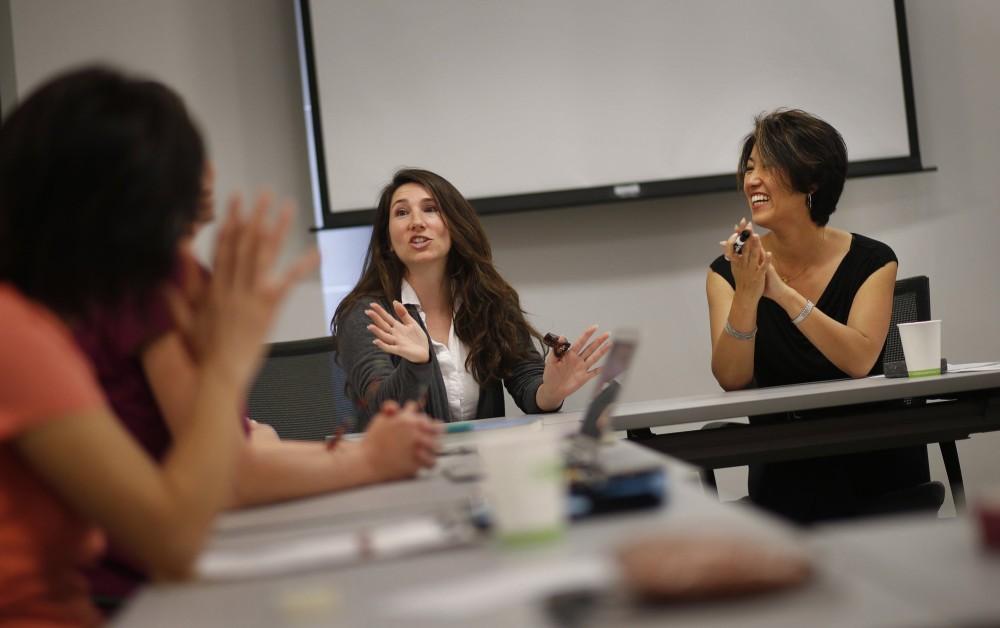By Paula Burkes
The Oklahoman, Oklahoma City.
Women workers are called “bossy” nearly twice as frequently as men — and the term comes with negative nuances when it’s used to describe women in the workplace, according to a new study.
The findings were released Sept. 24 by Eugene, Ore.-based Palo Alto Software, which recently polled visitors to its website on various gender issues. Among some 2,500 respondents, highlights include:
52 percent of women said they’ve experienced gender discrimination, compared with 9 percent of men;
36 percent of working fathers said having children has had no impact on their careers, compared with 19 percent of working moms; and
40 percent of women said they’ve been called “bossy” at work, compared with 22 percent of men.
Palo Alto chief executive Sabrina Parsons strongly advocates a change in corporate culture, starting with the definition of bossy.
Based on her company’s survey, both sexes agreed the term has a negative connotation when used to describe women in the workplace, Parsons said. She said one male respondent summed up the issue, saying, “Women get called ‘bossy’ while men are ‘giving direction.'”
Whether it’s used to describe men or women, bossy needs to mean “being forthright, taking control and being a leader,” Parsons said.
Oklahoma workers can relate to the challenge.
Freelance publicist Billie Rodely, former assistant news director and editor at Oklahoma City-based KTOK radio station said she’s been called worse than bossy.
“I got the nickname ‘Bitch of Broadcasting’ by people who didn’t like me editing their copy,” Rodely said. “But they all respected me. I usually explained my corrections.
buy viagra soft generic buy viagra soft online no prescription
”
Tulsa lawyer Melanie Alberts, a past administrative law judge for the Oklahoma Tax Commission, recalls one taxpayer complaining about “the bitch” to her superiors, after Alberts handed down a ruling he didn’t like.
“I’ve been called that many times,” she said. “It never bothered me. I always analogized it to assertive or aggressive, and I was definitely both of those.”
Shawnee retiree Jim Spencer said when he started his civilian jobs in 1965 there was less need to be “bossy” — for male or female supervisors, along with fewer government regulations or “escape clauses for employees.”
“There was a greater focus on giving a full day’s work for a full day’s pay,” Spencer said. “It was easier to let a worker go if there was a problem, and the worker was more inclined to toe the line.”
Over three decades in the workplace, Tulsa executive coach Jean Kelley said she’s seen opportunities grow exponentially for women, but no movement on women leaders not being called objectionable names.
“If women don’t say ‘please’ or ‘thank you,’ people think they’re impossible,” Kelley said. “But a man is ‘just busy.'”
Regardless, it doesn’t work for female, or male, managers to use aggressive, take-over, militaristic styles, she said.
Kelley knows all too well how a militaristic style backfires. At age 23, she was promoted to manager of a staffing company and led coworkers who were ages 30 to 55.
“It was on the heels of the collapse of Penn Square Bank, but I was pushing people hard,” she said.
“One woman’s daughter was having surgery, and I told her she’d have to find a way to make her marketing calls from the hospital.”
A mass employee walk-out was Kelley’s wake-up call, when she sought counseling and, among other things, learned the difference between being abusive and being demanding.
Years later, she asked her staff to reprint 500 fliers because of a tiny imperfection, caused by a spot on the glass of the office copier. That was demanding, she said.
Abusive, she said, would be if she’d railed, “Why didn’t you run a test copy? Even a child can get that!”
Kelley believes gender discrimination in the workplace will decline with 77 million Millennials entering the labor force over the next few years.
“Most have been raised by a strong mother,” she said, “and they believe in treating women and men the same.”














































































































































































































































































































































































